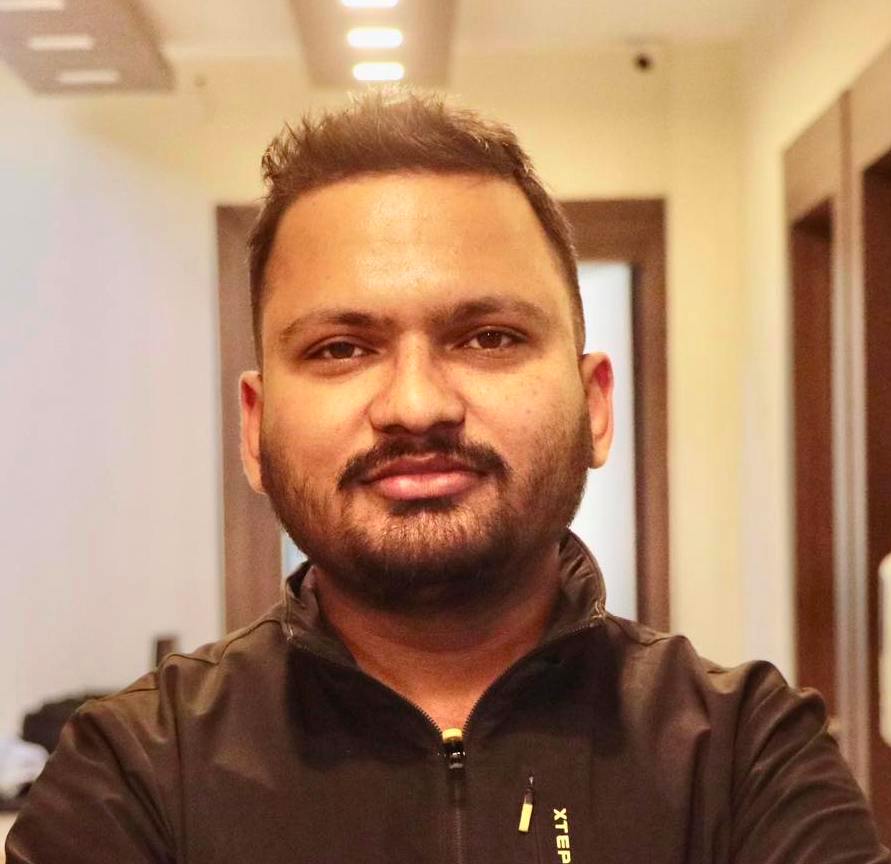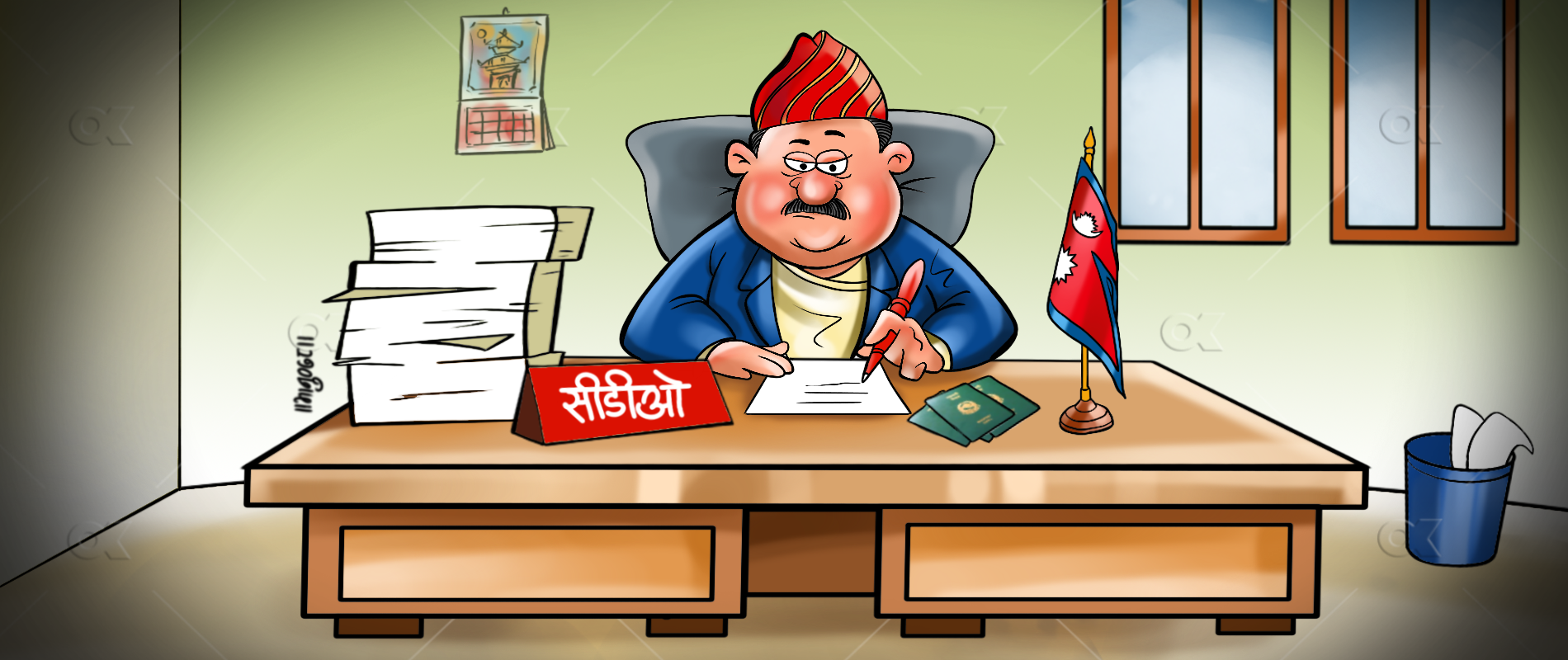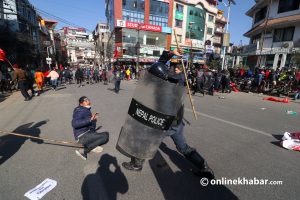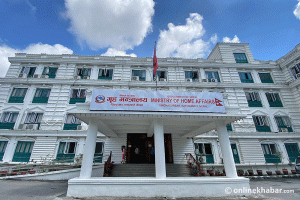Chief district officers (CDOs) in Nepal are respected a lot. Up until 1989, a man had to wear a Dhaka topi before he entered the office of the CDO. During the Panchayat era, CDOs were like the kings of the district. They were put up on a pedestal, unlike other government officials. Even during the peak of the Maoist revolution, people feared the CDOs.
Former secretary Dwarika Nath Dhungel says that back then, a CDO would know the ins and outs of a small incident in the district within 24 hours. The information mechanism was so organised, the CDO received every little information about every little incident. “Now, we don’t even know if they are there,” says Dhungel.
The CDOs were powerful because the laws favoured them. Even when multiparty democracy was established in 1990, the CDOs remained independent and autonomous from the parties that they supported. Their role would also be discussed a lot during public discourses, which shows how much they were respected. The CDOs would always be active during issues related to borders, citizenship, and internal security affairs.
That said, the power they had also resulted in misuse. An example of an incident in Terai highlights the misuse of power by a CDO. During the Panchayat era, a CDO was at the office terrace observing what was going on. Suddenly, he saw a marriage procession coming towards him. It was loud, and everyone seemed to be in a celebratory mood. That irked him as he ordered the police to stop the procession and hold them for an entire day. The groom and his entourage were only allowed to leave the next day.
But, that has changed as the CDOs now have little to none of their previous powers. Law, government structure and environment do not allow them to have the same power; their roles have changed from people who governed the district to people who act as mediators to government organisations, raising questions if they are relevant anymore.
Roles and responsibilities

For a long time, the District Administration Office (DAO), commonly called the CDO office, worked directly under the government and was quite important. If anyone wanted any government documents, they had to go to the CDO. They were the main people of a district. Even high-ranking government officials of other government offices had to seek a CDO’s permission before doing anything.
Until January 6, 1966, there were different administrative structures in the district. But, they were all replaced by the CDO, says Prachanda Pradhan, a former dean of the Tribhuvan University. The CDOs were tasked with developing the district, had an important role in peacekeeping and were also tasked with listening to people’s problems.
But, after many complained that the CDOs had too big roles, the government in 1980 took away the role of development from the CDOs and ordered them to stick to administration. An important amendment was made to the Local Administration Act, 1971, in 2001 that created the framework through which they are working today.
In 2015, another amendment was made as the CDOs were asked to help out in peacekeeping and development work carried out by the federal, provincial and local governments. They were also asked to help protect government land and maintenance of infrastructure developed by the government.
Losing power

But, after the country went into federalism, the CDOs’ roles have taken a further hit as much of their roles have been given to ward chairs and mayors. Likewise, various district-level government offices like District Education Office, District Agricultural Development Office, District Technical Office, etc, were scrapped. When they were in operation, even though each had its own chief, almost all of them reported directly to the CDO.
The CDOs had to monitor all these offices and supervise them. But now, they hardly have anything to do apart from offering citizenship certificates, passports, minor identity cards and indigenous identity card.
While the law has cut out a lot of their roles, the CDOs have become so helpless that they cannot take decisions alone. The way the CDOs handled the Covid-19 crisis in Kathmandu and other districts is a prime example of a lack of decision-making prowess.
The Local Administration Act, 1971, had given the CDOs the permission to lock down their districts. Even the Council of Ministers gave them the permission to do so. But, the CDOs hardly got to make this decision alone.
In the Kathmandu valley, they had to repeatedly go to the Home Ministry to ask for permission before they made any decision. Things are so bad that the letter that comes under the DAO’s name is printed at the Home Ministry itself.
The tussle between CDOs and elected representatives
There is a provision in the Disaster Risk Reduction and Management Act, 2017, to establish a District Disaster Management Committee under the leadership of the CDO. The committee also has local elected representatives. Even though the two need to work together, at most times, officials from the DAO and local representatives are at odds. There are instances where a local representative refuses to go to a meeting called by the CDO because they feel their role should be bigger.
This was seen during the aftermath of floods and landslides in Sindhupalchok as local representatives did not attend a single meeting of the committee. The DAO and the local elected officials kept making conflicting decisions on how to solve problems.
Citing relief had not reached the people affected by the flood and landslide, the DAO said that only one body would distribute aid. But, the Melamchi municipality issued a notice stating it would be distributing aid on its own and urged people to donate to it. Even when asked, the local representatives did not want to be involved in the work being carried out by the DAO. It even criticised the decisions made by the DAO in an all-party meeting.
Empowered local governments
The DAO is a quasi-judicial body. Before federalism, the DAO officials and the CDOs were asked to deal with a lot of things. But, since the introduction of federalism, most of it has been given to a committee formed by the municipalities and rural municipalities.
Issues like land disputes, family disputes, fights, cattle issues and pollution issues were all given to the local levels. The local level can also hire its own police force to deal with these issues.
Even though issues related to cattle, farming, production, cooperatives and drinking water were under the DAO, all of these now come under the local governments. The local level also decides to hand out contracts to people to mine rivers.
“Sometimes, I feel I’m stuck. I know they’re doing it illegally, but if I go monitor, the local level will complain that I’m overstepping. If I don’t, I find it morally wrong,” says a CDO, asking to remain anonymous.
Clarification or quashing?
But, former home secretary Govinda Kusum says that not enough homework was done before deciding to take the country into federalism. He says issues like the distribution of roles and responsibilities should have been decided in advance before taking such a huge step.
“Things are still a bit confusing. The CDOs are confused about what they can and cannot do. These things need to be clarified for them to work effectively,” says Kusum.
Some say that the CDOs should be under the provincial government, but that would mean different provinces will have different issues relating to safety and security, which is why the centre wants them under their jurisdiction.
But, internal affairs expert Khimlal Devkota says that it is pointless to have them under the central government when they have so little role to fulfil.
“It’s time the government decides, either give them better roles and make them strong or scrap the system entirely because right now, they are not effective.”






















